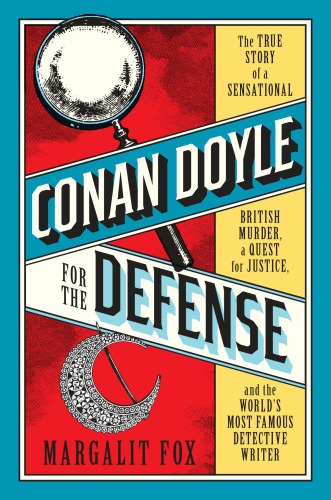
Conan Doyle for the Defense
How Sherlock Holmes's Creator Turned Real-Life Detective and Freed a Man Wrongly Imprisoned for Murder
کتاب های مرتبط
- اطلاعات
- نقد و بررسی
- دیدگاه کاربران
نقد و بررسی

Starred review from April 16, 2018
New York Times senior writer Fox (The Riddle of the Labyrinth) brings to life a forgotten cause célèbre in this page-turning account of how mystery-writer-turned-real life sleuth Arthur Conan Doyle helped exonerate a man who was wrongfully convicted of murder. In 1908, Marion Gilchrist was found bludgeoned to death in her Glasgow home. Early into the investigation, the police centered their suspicions on Oscar Slater, a German Jew expat and known gambler, who was eventually convicted of the murder based on such shoddy evidence as the fact
that he’d pawned a brooch similar to one owned by Gilchrist that was missing from the scene of the crime. When Slater’s attorneys reached out to Conan Doyle after the trial, the author investigated the case using the method of rational inquiry that was inspired by his medical training and was the hallmark of his famous creation, Sherlock Holmes. Through “Holmesian acumen and Watsonian lucidity, dismantles the Slater case plank by plank,” Fox writes, starting with the brooch, which he deemed inconsequential: first, because it was not a match for the missing one, and, secondly, because it had been pawned by Slater before Gilchrist’s death. Taking a cue from Conan Doyle, Fox then uses the brooch to show how Slater was likely framed for the crime, and how both class bias and anti-Semitism influenced the rush to convict him. The author’s exhaustive research and balanced analysis make this a definitive account, with pertinent repercussions for our times.

May 15, 2018
Oscar Slater was a pimp, a gangster, and a friend to scum, but he didn't deserve what happened to him. He was accused of a 1908 Glasgow murder he didn't commit?based on evidence that didn't prove anything, identified by eyewitnesses who were manipulated by the police?and spent nearly 20 years in a hellhole of a Scottish prison. Slater secured his place in history when the whole sordid matter came to the attention of Sir Arthur Conan Doyle. The creator of Sherlock Holmes applied the Great Detective's methods, and, in time, Slater was freed. Fox does a marvelous job following Doyle's piecing together of the case, noting that the methods of the detective were rooted in Doyle's medical background. Like Holmes, Doyle is, in effect, diagnosing a crime scene, only this time in real life. Each cigarette butt is aching to tell its story; learn to listen. Fox also links the new century's fascination with the evolving philosophy of empiricism, which, like Holmes, stressed that absorbing the evidence of the senses is the first step in answering the question, What happened? A compelling true-crime account.(Reprinted with permission of Booklist, copyright 2018, American Library Association.)

Starred review from May 1, 2018
Miscarriages of justice always leave a stain on the legal landscape, especially when deliberate. Fox's (senior writer, The New York Times) latest book explores such a mistake. In 1909, Oscar Slater, a German Jew who had recently arrived in Glasgow, Scotland, was wrongfully convicted of a grisly murder. While Slater had criminal tendencies and a murky past, he was no killer. Despite his obvious innocence, Glasgow Police and the Lord Advocate, Scotland's top prosecutor, spun a circumstantial case into a conviction. Originally sentenced to hang, Slater's punishment was commuted to life imprisonment with hard labor after 20,000 people petitioned the Scottish government. Slater was sent to Peterhead, a notorious Scottish prison. Sherlock Holmes creator Arthur Conan Doyle was outraged. Convinced that the case was one of reflexive prejudice--a common Victorian approach to criminal investigation--he set out to prove Slater's innocence. Starting in 1912, with the publication of The Case of Oscar Slater, he would eventually prevail in 1927, when Slater finally won an appeal. VERDICT Expertly constructed, this work will appeal to Conan Doyle fans and is ideal for all true crime collections. [See Prepub Alert, 12/11/17.]--Penelope J.M. Klein, Fayetteville, NY
Copyright 2018 Library Journal, LLC Used with permission.

May 1, 2018
In 1908, the police chose German Jewish cardsharp Oscar Slater as the handy suspect they could charge with the murder of an elderly Glasgow woman. Angered by the injustice, the famous creator of Sherlock Holmes spent nearly two decades examining the evidence and finally won Slater's freedom. From an award-winning senior writer at the New York Times.
Copyright 2018 Library Journal, LLC Used with permission.

























دیدگاه کاربران